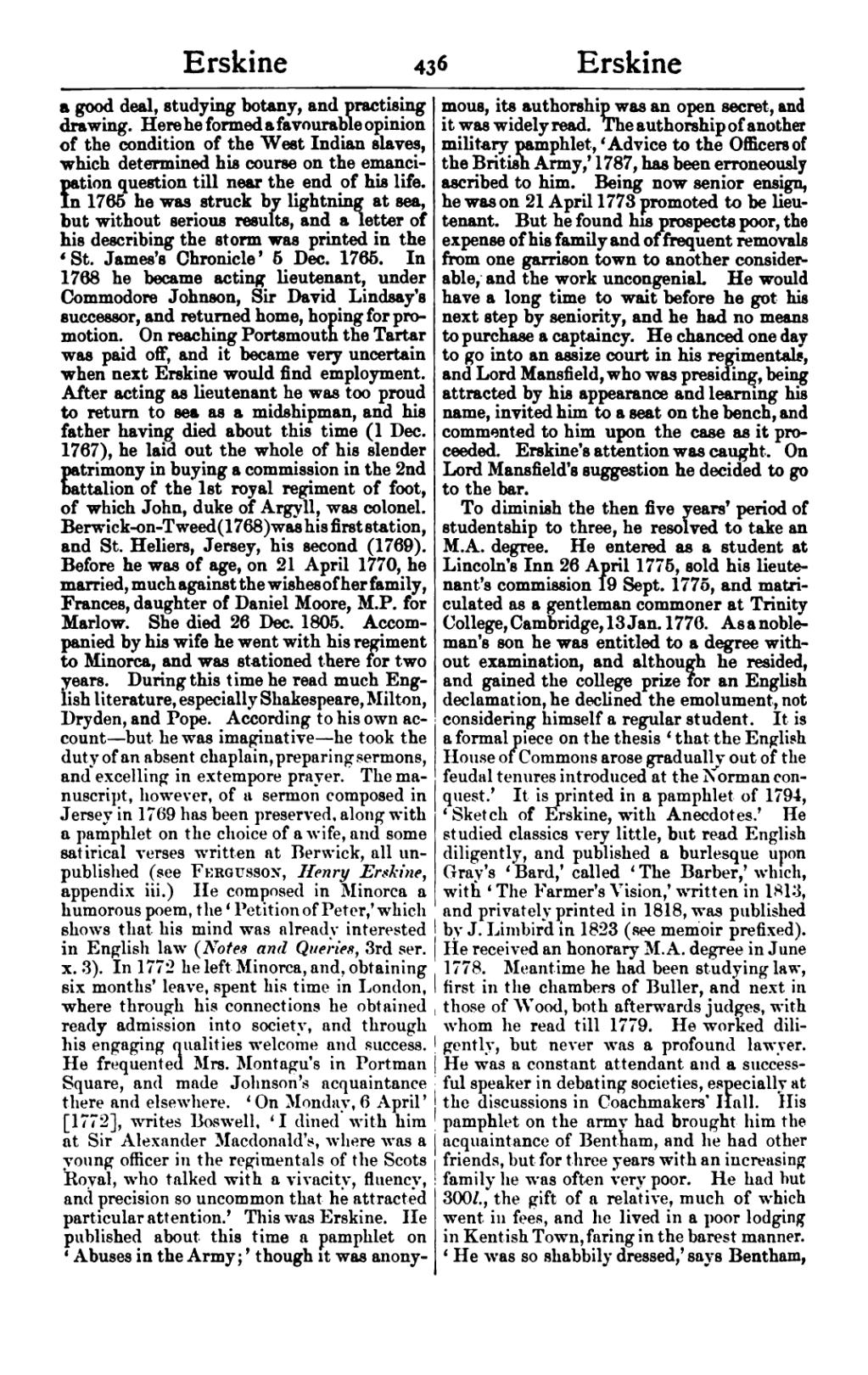a good deal, studying botany, and practising drawing. Here he formed a favourable opinion of the condition of the West Indian slaves, which determined his course on the emancipation question till near the end of his life. in 1765 he was struck by lightning at sea, but without serious results, and a letter of his describing the storm was printed in the 'St. James's Chronicle' 5 Dec. 1766. In 1768 he became acting lieutenant, under Commodore Johnson, Sir David Lindsay's successor, and returned home, hoping for promotion. On reaching Portsmouth the Tartar was paid off, and it became very uncertain when next Erskine would find employment. After acting as lieutenant he was too proud to return to sea as a midshipman, and his father having died about this time (1 Dec. 1767), he laid out the whole of his slender patrimony in buying a commission in the 2nd battalion of the 1st royal regiment of foot, of which John, duke of Argyll, was colonel. Berwick-on-Tweed (1768)was his first stat on, and St. Heliers, Jersey, his second (1769). Before he was of age, on 21 April 1770, he married, much against the wishes of her family, Frances, daughter of Daniel Moore, M.P. for Marlow. She died 26 Dec. 1805. Accompanied by his wife he went with his regiment to Minorca, and was stationed there for two years. During this time he read much English literature, especially Shakespeare, Milton, Dryden, and Pope. According to his own account—but he was imaginative—he took the duty of an absent chaplain, preparing sermons, and excelling in extempore prayer. The manuscript, however, of a sermon composed in Jersey in 1769 has been preserved, along with a pamphlet on the choice of a wife, and some satirical verses written at Berwick, all unpublished (see Fergusson, Henry Erskine, appendix iii.) he composed in Minorca a humorous poem, the 'Petition of Peter,' which shows that his mind was already interested in English law (Notes and Queries, 3rd ser. x. 3). In 1772 he left Minorca, and, obtaining six months' leave, spent his time in London, where through his connections he obtained ready admission into society, and through his engaging qualities welcome and success. He frequented Mrs. Montagu's in Portman Square, and made Johnson's acquaintance there and elsewhere. 'On Monday, 6 April' [1772], writes Boswell, 'I dined with him at Sir Alexander Macdonald's, where was a young officer in the regimentals of the Scots Roval, who talked with a vivacity, fluency, and precision so uncommon that he attracted particular attention.' This was Erskine. He published about this time a pamphlet on 'Abuses in the Army;' though it was anonymous, its authorship was an open secret, and it was widely read. The authorship of another military pamphlet, 'Advice to the Officers of the British Army,' 1787, has been erroneously ascribed to him. Being now senior ensign, he was on 21 April 1773 promoted to be lieutenant. But he found his prospects poor, the expense of his family and of frequent removals from one garrison town to another considerable, and the work uncongenial. He would have a long time to wait before he got his next step by seniority, and he had no means to purchase a captaincy. He chanced one day to go into an assize court in his regimentals, and Lord Mansfield, who was presiding, being attracted by his appearance and learning his name, invited him to a seat on the bench, and commented to him upon the case as it proceeded. Erskine's attention was caught. On Lord Mansfield's suggestion he decided to go to the bar.
To diminish the then five years' period of studentship to three, he resolved to take an M.A. degree. He entered as a student at Lincoln's Inn 26 April 1775, sold his lieutenant's commission 19 Sept. 1775, and matriculated as a gentleman commoner at Trinity College, Cambridge, 13 Jan. 1776. As a nobleman's son he was entitled to a degree without examination, and although he resided, and gained the college prize for an English declamation, he declined the emolument, not considering himself a regular student. It is a formal piece on the thesis 'that the English House of Commons arose gradually out of the feudal tenures introduced at the Norman conquest.' It is printed in a pamphlet of 1794, 'Sketch of Erskine, with Anecdotes.' He studied classics very little, but read English diligently, and published a burlesque upon Gray's 'Bard,' called 'The Barber,' which, with 'he Farmer's Vision,' written in 1813, and privately printed in 1818, was published by J. Limbird in 1823 (see memoir prefixed). He received an honorary M.A. degree in June 1778. Meantime he had been studying law, first in the chambers of Buller, and next in those of Wood, both afterwards judges, with whom he read till 1779. He worked diligently, but never was a profound lawyer.
He was a constant attendant and a successful speaker in debating societies, especially at the discussions in Coachmakers' Hall. His pamphlet on the army had brought him the acquaintance of Bentham, and he had other friends, but for three years with an increasing family he was often very poor. He had but 300l., the gift of a relative, much of which went in fees, and he lived in a poor lodging in Kentish Town, faring in the barest manner. 'He was so shabbily dressed,' says Bentham,
